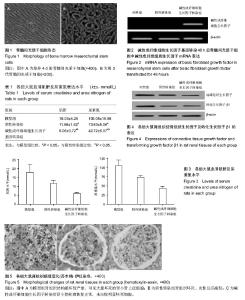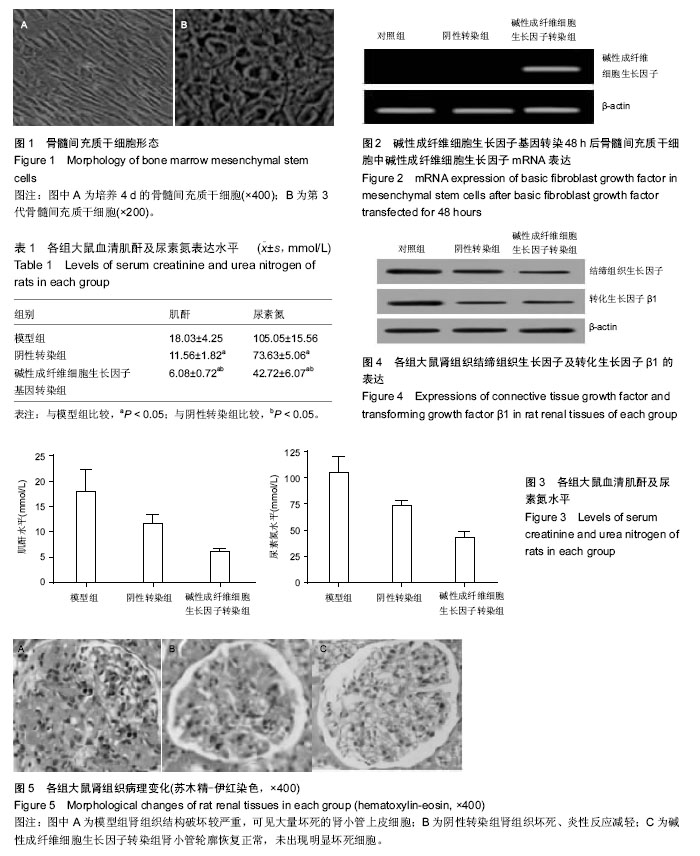| [1] 毛家玺,汤晓静.干细胞在急性肾损伤中的治疗作用及进展[J].中国中西医结合肾病杂志,2012,13(1):86-88.
[2] 甘露.间充质干细胞治疗急性肾损伤的临床应用可行性探讨[J].特别健康,2014,3(3):39.
[3] 李季.人类bFGF基因在大鼠骨髓间充质干细胞的表达及其分子作用机制研究[D].济南:山东大学,2004.
[4] Herrera MB, Bussolati B, Bruno S, et al. Mesenchymal stem cells contribute to the renal repair of acute tubular epithelial injury. Int J Mol Med. 2004;14(6):1035-1041.
[5] 龚圆渊.六味地黄丸联合bFGF诱导骨髓间充质干细胞向神经元样细胞分化的研究[D].成都: 成都中医药大学, 2012.
[6] 孔根现. VEGF分别与bFGF、aFGF联合诱导骨髓间充质干细胞分化为血管内皮细胞[D].广州: 南方医科大学, 2013.
[7] Lee SK, Kim Y, Kim SS, et al. Differential expression of cell surface proteins in human bone marrow mesenchymal stem cells cultured with or without basic fibroblast growth factor containing medium. Proteomics. 2009;9(18):4389-4405.
[8] Strioga M, Viswanathan S, Darinskas A, et al. Same or not the same? Comparison of adipose tissue-derived versus bone marrow-derived mesenchymal stem and stromal cells. Stem Cells Dev. 2012;21(14):2724-2752.
[9] 和小娥,任卫青,邓立新,等.生长因子对兔骨髓间充质干细胞增殖的影响[J].畜牧兽医学报,2012,43(4):553-557.
[10] 郑有华,张志光,苏凯,等.体外培养条件下人骨髓间充质干细胞碱性成纤维细胞生长因子基因的转染与鉴定[J].中国组织工程研究与临床康复,2010,14(19):3507- 3512.
[11] Xu X, Shao N, Qiao D, et al. Expression of vascular endothelial growth factor and basic fibroblast growth factor in extramammary Paget disease.Int J Clin Exp Pathol. 2015;8(3):3062-3068.
[12] 胡红林,王共先,邹丛,等.BALB/c小鼠肾缺血再灌注损伤模型的建立与评价[J].中国组织工程研究与临床康复, 2011,15(5): 870-873.
[13] 吴佳奇,冯大雄,杨天府,等.骨髓间充质干细胞经蛛网膜下腔移植治疗大鼠脊髓损伤及其对T细胞亚群影响的研究[J].中国修复重建外科杂志,2007,21(5): 492-496.
[14] 李辉映,文益民,陈克明,等.多次移植骨髓基质干细胞有利于脊髓损伤修复[J].中国矫形外科杂志,2009,17(22): 1725-1728.
[15] 徐云强,冯世庆,王沛,等.软骨素酶联合雪旺细胞移植促进脊髓损伤修复的研究[J].中华实验外科杂志,2010,27(7): 972-975.
[16] Turnbull IR, Clark AT, Stromberg PE, et al. Effects of aging on the immunopathologic response to sepsis. Crit Care Med. 2009;37(3):1018-1023.
[17] Liu WH, Huang HQ, Deng YH, et al. Effects of berberine on renal function, oxidative stress and renal aldose reductase in rats with diabetic nephropathr. Chin Pharmacol Bull. 2008;24(7):955-959.
[18] 葛成国,靳凤烁,李黔生,等.过表达Bcl-2雪旺细胞抗凋亡能力的实验研究[J].中国康复医学杂志,2004,19(2): 95-97.
[19] 牛志宏,高德轩,丁森泰,等. Cyr61,CTGF,NOV,WISP-1 基因在肾癌中的表达[J].山东大学学报:医学版, 2008, 46(7):701-703,714.
[20] 王莉. 华勒变性及少突胶质前体细胞和雪旺细胞移植[D].上海:上海交通大学,2008.
[21] 李军. 嗅鞘细胞蛛网膜下腔移植治疗脊髓损伤的实验研究[D]. 泰安:泰山医学院,2011.
[22] Yu PJ, Ferrari G, Galloway AC, et al. Basic fibroblast growth factor (FGF-2): the high molecular weight forms come of age. J Cell Biochem. 2007;100(5):1100-1108.
[23] Bhagavati S, Xu W. Isolation and enrichment of skeletal muscle progenitor cells from mouse bone marrow. Biochem Biophys Res Commun. 2004; 318(1):119-124.
[24] Fujita T, Shiba H, Van Dyke TE, et al. Differential effects of growth factors and cytokines on the synthesis of SPARC, DNA, fibronectin and alkaline phosphatase activity in human periodontal ligament cells. Cell Biol Int. 2004;28(4):281-286.
[25] Shin H, Zygourakis K, Farach-Carson MC, et al. Modulation of differentiation and mineralization of marrow stromal cells cultured on biomimetic hydrogels modified with Arg-Gly-Asp containing peptides. J Biomed Mater Res A. 2004;69(3):535-543.
[26] Ma Y, Lang L, Kiesewetter DO, et al. Purification of the precursor for the automated radiosynthesis of [18F]FCWAY by counter-current chromatography. J Chromatogr A. 2004;1034(1-2):149-153.
[27] Talbot NC, Powell AM, Caperna TJ. Comparison of colony-formation efficiency of bovine fetal fibroblast cell lines cultured with low oxygen, hydrocortisone, L-carnosine, bFGF, or different levels of FBS. Cloning Stem Cells. 2004;6(1):37-47.
[28] Haider M, Cappello J, Ghandehari H, et al. In vitro chondrogenesis of mesenchymal stem cells in recombinant silk-elastinlike hydrogels. Pharm Res. 2008;25(3):692-699.
[29] Bojin FM, Gruia AT, Cristea MI, et al. Adipocytes differentiated in vitro from rat mesenchymal stem cells lack essential free fatty acids compared to adult adipocytes. Stem Cells Dev. 2012;21(4):507-512.
[30] Jump SS, Childs TE, Zwetsloot KA, et al. Fibroblast growth factor 2-stimulated proliferation is lower in muscle precursor cells from old rats. Exp Physiol. 2009; 94(6):739-748.
[31] Tögel F, Cohen A, Zhang P, et al. Autologous and allogeneic marrow stromal cells are safe and effective for the treatment of acute kidney injury. Stem Cells Dev. 2009;18(3):475-485.
[32] Iwasaki M, Adachi Y, Minamino K, et al. Mobilization of bone marrow cells by G-CSF rescues mice from cisplatin-induced renal failure, and M-CSF enhances the effects of G-CSF. J Am Soc Nephrol. 2005;16(3): 658-666.
[33] Morigi M, Rota C, Montemurro T, et al. Life-sparing effect of human cord blood-mesenchymal stem cells in experimental acute kidney injury. Stem Cells. 2010; 28(3):513-522.
[34] Chade AR, Zhu X, Lavi R, et al. Endothelial progenitor cells restore renal function in chronic experimental renovascular disease. Circulation. 2009;119(4): 547-557.
[35] Tsuda H, Yamahara K, Ishikane S, et al. Allogenic fetal membrane-derived mesenchymal stem cells contribute to renal repair in experimental glomerulonephritis. Am J Physiol Renal Physiol. 2010;299(5):F1004-1013.
[36] Siegel N, Rosner M, Unbekandt M, et al. Contribution of human amniotic fluid stem cells to renal tissue formation depends on mTOR. Hum Mol Genet. 2010; 19(17):3320-3331.
[37] Patschan D, Krupincza K, Patschan S, et al. Dynamics of mobilization and homing of endothelial progenitor cells after acute renal ischemia: modulation by ischemic preconditioning. Am J Physiol Renal Physiol. 2006;291(1):F176-185.
[38] Rampino T, Gregorini M, Bedino G, et al. Mesenchymal stromal cells improve renal injury in anti-Thy 1 nephritis by modulating inflammatory cytokines and scatter factors. Clin Sci (Lond). 2011;120(1):25-36.
[39] Iwasaki M, Adachi Y, Minamino K, et al. Mobilization of bone marrow cells by G-CSF rescues mice from cisplatin-induced renal failure, and M-CSF enhances the effects of G-CSF. J Am Soc Nephrol. 2005;16(3): 658-666.
[40] Tögel F, Cohen A, Zhang P, et al. Autologous and allogeneic marrow stromal cells are safe and effective for the treatment of acute kidney injury. Stem Cells Dev. 2009;18(3):475-485. |

